People in middle-income countries are more likely than those in high-income countries to view China’s economic influence positively
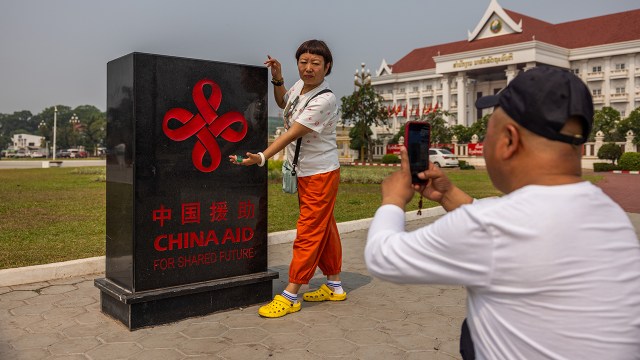
This Pew Research Center analysis focuses on public opinion of China in 35 countries across the Asia-Pacific region, Europe, Latin America, the Middle East-North Africa region, North America and sub-Saharan Africa. Views of China are examined in the context of long-term trend data.
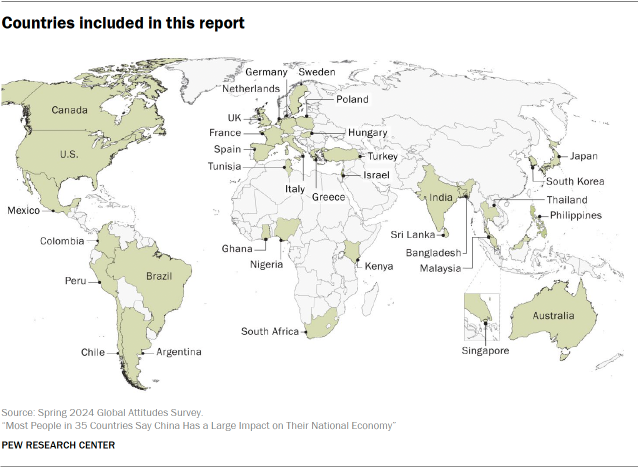
For non-U.S. data, this analysis draws on nationally representative surveys of 40,566 adults conducted from Jan. 5 to May 21, 2024. All surveys were conducted over the phone with adults in Canada, France, Germany, Greece, Italy, Japan, Malaysia, the Netherlands, Singapore, South Korea, Spain, Sweden and the United Kingdom. Surveys were conducted face-to-face in Argentina, Bangladesh, Brazil, Chile, Colombia, Ghana, Hungary, India, Israel, Kenya, Mexico, Nigeria, Peru, the Philippines, Poland, South Africa, Sri Lanka, Thailand, Tunisia and Turkey. In Australia, we used a mixed-mode probability-based online panel.
In the United States, we surveyed 3,600 adults from April 1 to April 7, 2024. Everyone who took part in this survey is a member of the Center’s American Trends Panel (ATP), an online survey panel that is recruited through national, random sampling of residential addresses. This way nearly all U.S. adults have a chance of selection. The survey is weighted to be representative of the U.S. adult population by gender, race, ethnicity, partisan affiliation, education and other categories. Read more about the ATP’s methodology.
Throughout the report, we analyze respondents’ attitudes based on where they place themselves on an ideological scale. We asked about political ideology using several slightly different scales and categorized people as being on the ideological left, center or right.
- In most countries, we asked people to place themselves on a scale ranging from “Extreme left” to “Extreme right.” The question was asked this way in Argentina, Bangladesh, Brazil, Canada, Chile, Colombia, France, Germany, Greece, Hungary, Israel, Italy, Mexico, the Netherlands, Nigeria, Peru, the Philippines, Poland, South Africa, Spain, Sweden, Turkey and the United Kingdom.
- In Australia, the scale ranged from “Left” to “Right.”
- In Japan, Singapore, South Korea and Thailand, ideology was measured on a scale from “Extremely progressive” to “Extremely conservative.”
- In the U.S., ideology is defined as conservative (right), moderate (center) and liberal (left).
- Ideology was not asked about in Ghana, India, Kenya, Malaysia, Sri Lanka or Tunisia.
Prior to 2024, combined totals were based on rounded topline figures. For all reports beginning in 2024, totals are based on unrounded topline figures, so combined totals might be different than in previous years. Refer to the 2024 topline to see our new rounding procedures applied to past years’ data.
Here are the questions used for the report, along with responses, and the survey methodology.
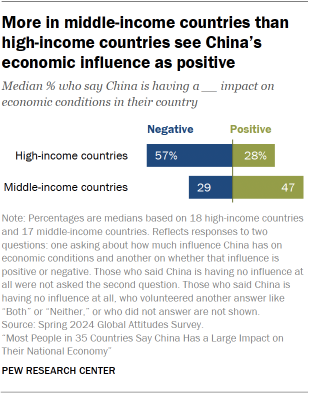
People around the world feel China’s economic influence where they live, according to a new Pew Research Center survey of 35 countries.
Large majorities in nearly all the nations we polled – spanning six continents and ranging in income level – say China has a great deal or a fair amount of influence on their country’s economic conditions.
And China’s economic influence is now felt more widely than it was when we last asked this question in 2019. In 10 of the 13 countries where trend data is available, a larger share say China has a great deal of impact on their country’s economy than said so five years ago.
But whether people see this influence as positive or negative varies widely. In most of the middle-income countries included in the survey, people tend to view China’s economic influence as a good thing. But in the high-income countries, people tend to see it as a bad thing.
- In the 17 middle-income countries surveyed, a median of 47% of adults say China has a positive influence on their country’s economy, while 29% say it has a negative impact.
- In the 18 high-income countries surveyed, a median of 57% of adults say China’s economic influence is negative, while 28% say it’s positive.
For this report, we grouped countries into high-income and middle-income categories based on definitions from the World Bank.
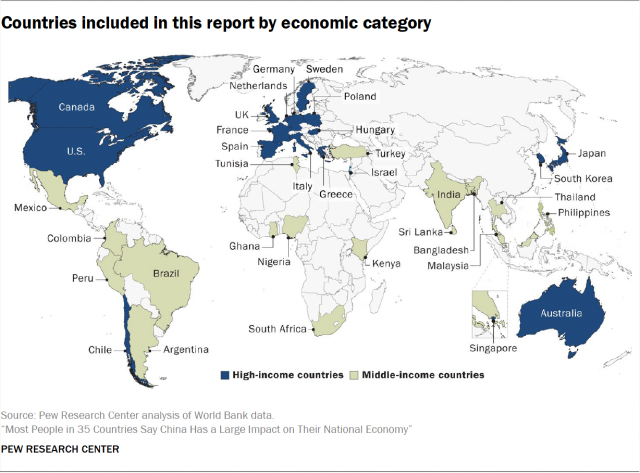
Americans are the most likely to have negative views of China’s economic impact. About three-quarters say China’s influence on the U.S. economy is negative. (Read more about Americans’ views of China in our May report.)
Where views on China’s economic influence have changed, they have generally become more negative. In Argentina, Brazil, Israel, Japan, South Korea and Tunisia, more say China has a negative economic influence on their country than said so in 2019. (Read more about perceptions of China’s economic impact in Chapter 2.)
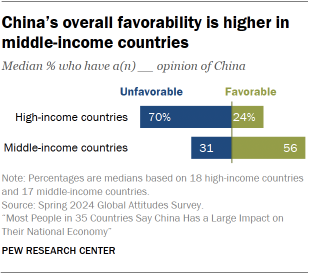
Overall favorability of China follows a similar pattern to views of its economic influence:
- Across the high-income countries surveyed, a median of 70% view China unfavorably.
- Across the middle-income countries surveyed, a median of 56% view China favorably. (Read more about favorability in Chapter 1.)
These are among the key findings of a new survey of 44,166 people in 35 countries conducted from Jan. 5 to May 21, 2024.
The report also includes some questions only asked in the Asia-Pacific region or in specific middle-income countries.
Views of Chinese firms are mixed
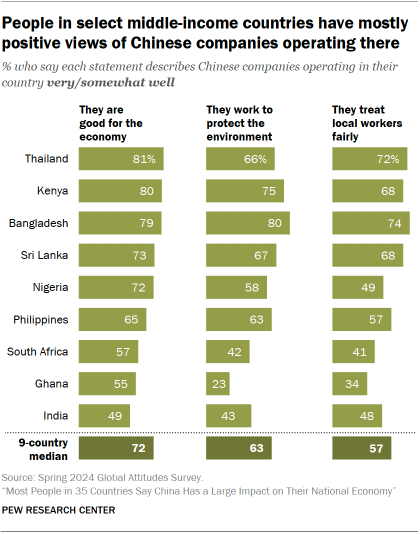
China launched its Belt and Road Initiative in 2013. Today, more than 10 years into the initiative, the country’s global outward foreign direct investment is close to $3 trillion. And according to a Bloomberg analysis of data from China’s Ministry of Commerce, its investments overseas are at their highest point in the last eight years.
At the same time, controversies have arisen about the environmental impact of Chinese firms operating abroad, how their workers are treated, and even whether Chinese investments benefit local economies or act as harmful competition.
Still, people in a number of middle-income nations have a positive impression of Chinese companies operating there. Across the nine nations where we asked about this, a 72% median say Chinese companies are good for their country’s economy. Views are most positive in Thailand (81%), Kenya (80%) and Bangladesh (79%), though a majority or plurality hold this view in each of the nine surveyed countries.
When it comes to whether Chinese companies work to protect the environment in these countries, opinion is a bit cooler. A median of 63% say Chinese companies do work to protect the environment. But in Ghana and South Africa, large shares say they do not.
Opinion is even more mixed on whether Chinese companies in each country treat local workers fairly. In Ghana, Nigeria, the Philippines and South Africa, around four-in-ten or more do not think Chinese companies operating in their country treat local workers fairly. (Read more about views of Chinese firms in Chapter 2.)
China’s territorial disputes concern many in Asia-Pacific countries
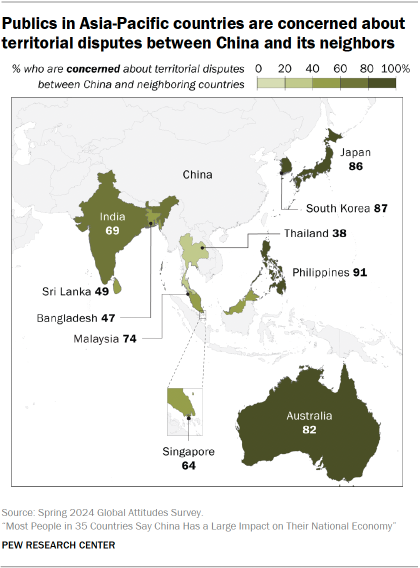
China is party to multiple territorial disputes in the Asia-Pacific region, whether related to the South China Sea, the East China Sea or even specific borders such as those between China and India. Of the 10 Asia-Pacific countries we surveyed, majorities or pluralities in all but Thailand are at least somewhat concerned about these territorial disputes.
In the Philippines, for example, where border tensions with China largely center on the Second Thomas Shoal of the Spratly Islands, 91% say they are concerned about territorial disputes between China and its neighbors, including 65% who are very concerned. (Since fielding, the conflict has flared up over a collision in the area between Chinese and Philippine ships.)
Around three-quarters or more in Australia, Japan, Malaysia and South Korea also express concern. (Read more about views of China’s territorial disputes in Chapter 3.)
In the Asia-Pacific, views differ on whether China contributes to global peace and stability
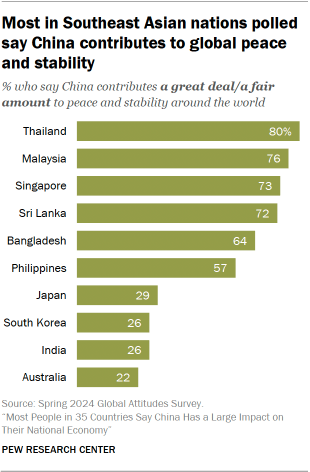
Across the Asia-Pacific region, we also asked people whether China contributes to peace and stability around the world. Opinion is divided: In Malaysia and Thailand, around two-thirds or more see it playing this role. About three-in-ten or fewer say the same in Australia, India, Japan and South Korea.
When we asked this question in 24 countries in 2023, Australians, Japanese and South Koreans were some of the least likely to say China contributes to global peace and stability. They remain some of the most critical, but to a lesser extent than last year. Still, these three publics are generally less likely to say China plays this stabilizing role than to say the same about other regional powers we asked about (Australia, India and Japan).
(Read more about views of China’s role on the world stage in Chapter 3.)




